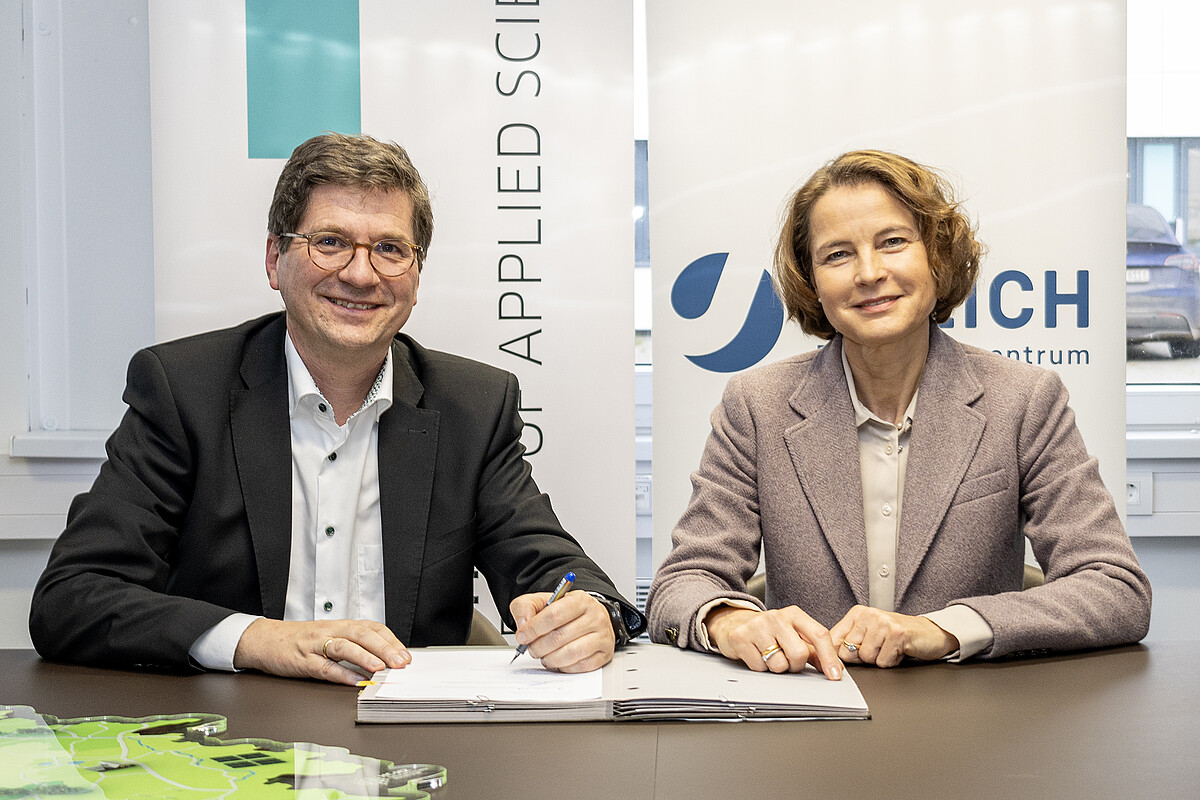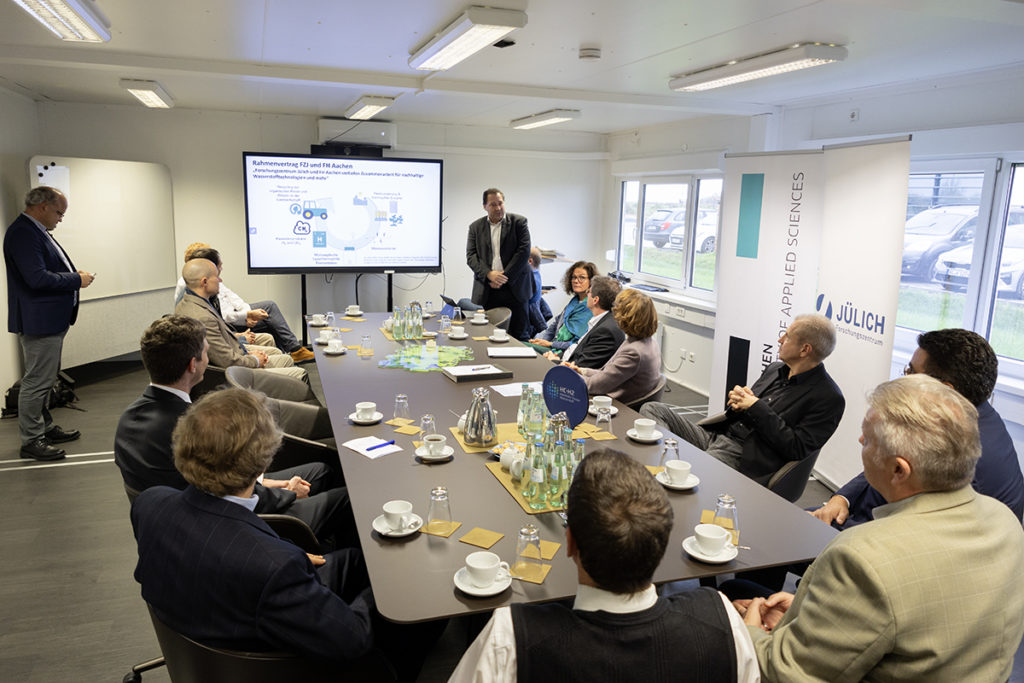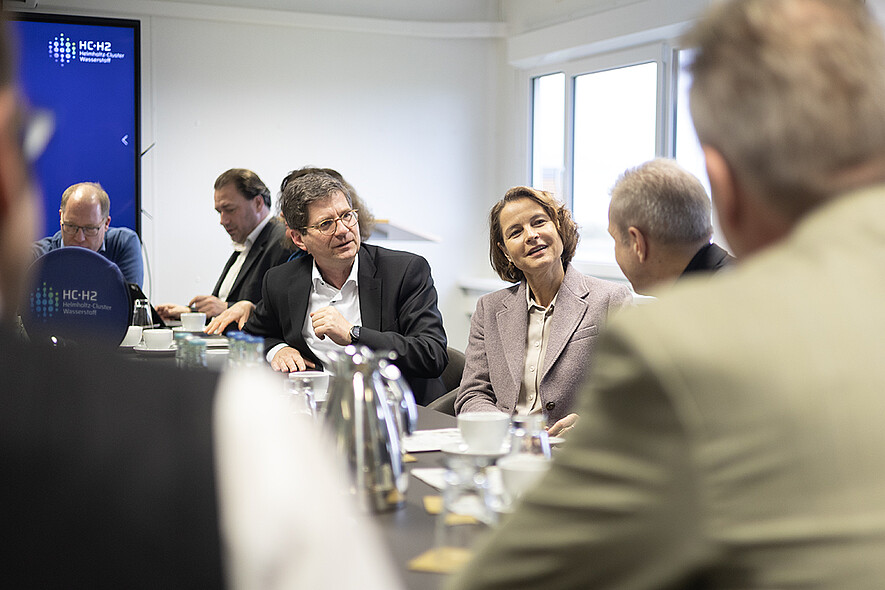Hello, neighbour!

Prof. Dr. Thomas Ritz, Rector of FH Aachen (left), and Prof. Dr. Astrid Lambrecht, Chair of the Board of Directors of Forschungszentrum Jülich, sign the cooperation agreement. Photos: FH Aachen/Gottschalk
Hydrogen technologies: Forschungszentrum Jülich and FH Aachen are cooperating
The new partnership aims to make greater use of synergies between research and practice in order to jointly develop innovative technologies and solutions and thus contribute to the sustainable transformation of the region.
Forschungszentrum Jülich (FZJ) and FH Aachen have signed a cooperation agreement at Brainergy Park Jülich to further intensify and expand their collaboration, particularly in the field of hydrogen technologies. The aim is to actively support the regional economy in the Rhenish mining area in meeting the challenges of the energy transition and structural change, and to cover the entire value chain from basic research to application.
Transformation of the region
The new partnership aims to make greater use of synergies between research and practice in order to jointly develop innovative technologies and solutions, thus contributing to the sustainable transformation of the region.
‘The continuation and expansion of our cooperation with FH Aachen is an important step for the successful transfer of knowledge in the Aachen-Jülich science region,’ says Prof. Dr. Astrid Lambrecht, Chair of the Board of Directors of Forschungszentrum Jülich and a member of the FH Aachen University Council. ’Cooperation such as this is of great importance for our scientists and for the entire region, especially in the context of structural change.’
The FH Aachen also sees great potential in more intensive cooperation with the FZJ. Prof. Dr. Thomas Ritz, rector of the FH Aachen: ‘The research conducted at the FZJ is outstanding. With our regional roots and practical orientation, we as a university can help to ensure that this top-level research finds its way into practical applications.’
New economic power
A particular focus of the cooperation is on the hydrogen economy, which is considered an important building block for the future of energy in the lignite region around Jülich in the Rhineland. There is already a collaboration between Forschungszentrum Jülich and FH Aachen that is to be expanded in the future: Prof. Dr. Peter Wasserscheid, founding director of the Institute for Sustainable Hydrogen Economy (INW) at FZJ, is working together with Prof. Dr. Nils Tippkötter from the Department of Chemistry and Biotechnology at the Jülich campus of FH Aachen on new technologies for a sustainable hydrogen economy.
‘We are developing and demonstrating pioneering technologies here in the Rhenish mining region,’ says Prof. Dr. Wasserscheid. ’In doing so, we are creating new economic potential locally and making the world a strong offer for building a climate-friendly energy system of the future. If we can’t succeed here, then where?’ Prof. Tippkötter adds: ‘The interplay between basic and applied research is crucial to shaping structural change. With our high-quality, practical hydrogen research and many years of cooperation with small and medium-sized companies, we ideally complement the scientific excellence of FZJ.’
Further areas besides hydrogen
In addition to hydrogen research, the cooperation includes a large number of joint projects in physics, energy and information technology, as well as nano- and biotechnology. These include, among other things, developments in medical imaging, artificial intelligence, chatbots, laser technology and biosensors, as well as in the digital bioeconomy. In the field of education, FZJ and FH Aachen have been successfully cooperating for over 20 years, for example in the degree programme in Applied Mathematics and Computer Science, in which Forschungszentrum Aachen plays an important role in training students to become mathematical-technical software developers.



